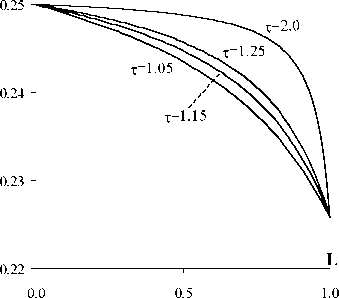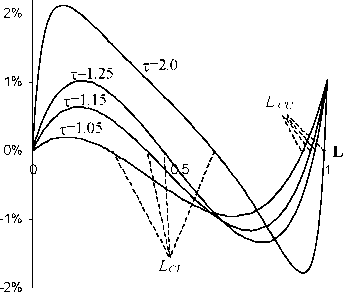received by taxing the agricultural sector, which itself creates a distortion.
However, the positive sign of the optimal rates of (12) indicates an overall
regional welfare gain of taxing agricultural consumption.
Optimal tax and tariff of (12) depend on the chosen policy of the foreign
region, which itself depend on the decision of the domestic region. Policy
Nash-equilibrium is achieved, if (12) is fulfilled for both regions. Unfortu-
nately, this equations system is non-linear, such that only numerical solu-
tions can be derived. Figure 2 illustrates the percental welfare gain of such
regional policies compared with the case of zero taxes and tariffs for certain
distributions of skilled labor on both regions.
Optimal tariffs

Real income gain

Parameters: γ = 0.5, σ = 4
Figure 2: Domestic optimal tariffs and real income gain at Nash-equilibrium
Quite surprising, if governments follow the optimal policy rule of (12)
there is no automatic gain for both regions. Denoting the lower critical level
of development by LCL and the upper critical level by LCU the domestic
region gains only if the relative number of industries is below LCL or above
LCU . Furthermore, falling transport costs imply a decrease of LCL and LCU .
Integration in the sense of falling trade costs (except tariffs) reduces the
opportunity for less developed regions and improves the opportunity of high
developed regions to achieve regional welfare gains by corresponding optimal
11
More intriguing information
1. The Shepherd Sinfonia2. Investment and Interest Rate Policy in the Open Economy
3. The name is absent
4. Categorial Grammar and Discourse
5. Willingness-to-Pay for Energy Conservation and Free-Ridership on Subsidization – Evidence from Germany
6. Optimal Taxation of Capital Income in Models with Endogenous Fertility
7. The name is absent
8. Synthesis and biological activity of α-galactosyl ceramide KRN7000 and galactosyl (α1→2) galactosyl ceramide
9. Evidence-Based Professional Development of Science Teachers in Two Countries
10. Fiscal Reform and Monetary Union in West Africa